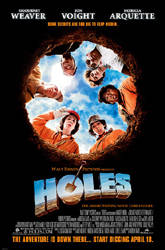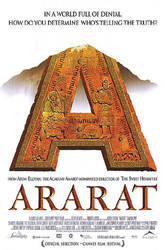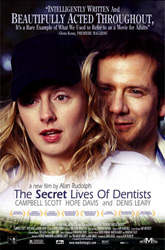 Director: Starring: Release: 18 Apr. 03
|
Holes BY: DAVID PERRY In the final years of elementary school my literature teachers decided on a project that would allow the students to have their own choice in what books they were reading. Hoping, I suppose, to ensure that we read something of quality and to discourage anyone who might pick up a Vonnegut or Burroughs novel, we were only allowed to choose from the novels that had won the Newbery Medal for excellence in children's literature. [For anyone interested, the four books I chose were The Cat Who Went to Heaven, Sounder, Bridge to Terabithia, and It's Like This, Cat. We were also required to read the most recent medal winner one year, Sarah, Plain and Tall.] The Newbery Medal, like the Pulitzer, the Oscar, et al., carries a great amount of weight in elementary school circles because they could give teachers something to assign. However, they miss out on another important part of the children's formative education: the willingness to read them without the prodding of an in-class presentation. Louis Sachar's Holes, which won the Newbery Medal in 1999, is important not because of the many literary awards it has won (it also received a National Book Award) but because kids excitedly read it on for their own personal pleasure. The way this book -- which is evidently better than the Harry Potter books, more accessible, but unfortunately less successful -- has grown as word-of-mouth phenomenon for kids looking for something to read that is actually enriching reminds of those bygone days when people were passing around a copy of S.E. Hinton's The Outsides in junior high because of its use of taboo subjects and because it was a damn good read. I haven't read Holes but after seeing the movie it is based on, I desperately want to. Part of the reason why this film has done so well with critics, most of whom are middle-aged men, is because it has the same adolescent naďveté that drew us into those books when we were kids. I may not be near the same age as, say, Roger Ebert or Stanley Kaufman, but I'm certain there were books that weighed on their evolution as readers as strongly as The Outsiders did for me and as Holes is evidently doing for today's young readers. The movie draws on that same tone, one of youthful exuberance hindered by society and the adults that just don't understand (to paraphrase Will Smith in his Newbery-deserving poem). Holes, meanwhile, brings in a mystical side that cannot be seen in the advertisements for the movie or the dust covers for the book. From my point-of-view, Holes works for adults as much as -- if not more than -- kids because it brings us back into our childhoods. For two hours, the thirtysomethings in the theatre become the thirteensomethings. The frame story in Holes is about Stanley Yelnats IV (LaBeouf), so named for generations because 'Yelnats' is Stanley backwards. A chance encounter with some shoes and his attempt to give them to his shoe scientist father Stanley Yelnats III (Winkler), gets him unjustly arrested for the theft of these shoes. The judge sends him to Camp Green Lake, a labor camp for juvenile delinquents in the middle of the desert, where the prisoners spend each day digging five-by-five holes to build character. But within are two other stories. First is the tale of the family curse, which Stanley's grandfather (Davis) blames for all the misfortune that has fallen on the men of the Yelnats family, in which an ancestor failed to keep his side of a bargain and aggravated a Latvian fortuneteller (Kitt). The other tale is of a romance in the Old West that has something to do with the reason why all these kids are digging these holes for their ice-queen warden (Weaver). Holes is never condescending, always respectful of what kids can understand
about what they are reading or watching. There are many levels and many connections
created between different parts of the story, and director Andrew Davis (bringing the same
atmospheric verisimilitude he brought to thrillers like The Fugitive and
A Perfect Murder)
and Sachar, who did his own adaptation, are game for the move of the story from the page
to the screen without losing the affect. Briskly edited by Thomas J. Nordberg and Jeffrey
Wolf, Holes has a command of the audience that keeps them interested from beginning to
end, waiting with anticipation for the next revelation. If you'll excuse my pun, it's a
cinematic page-turner. |
|
| ©2003, David Perry, Cinema-Scene.com, 2 May 2003 | ||








